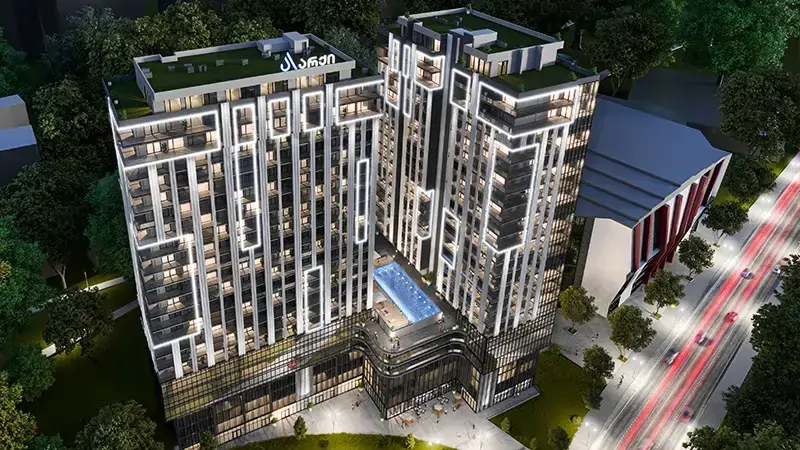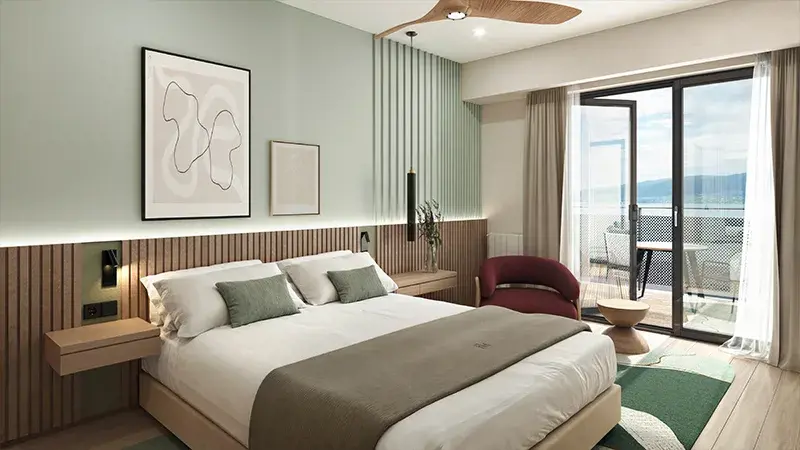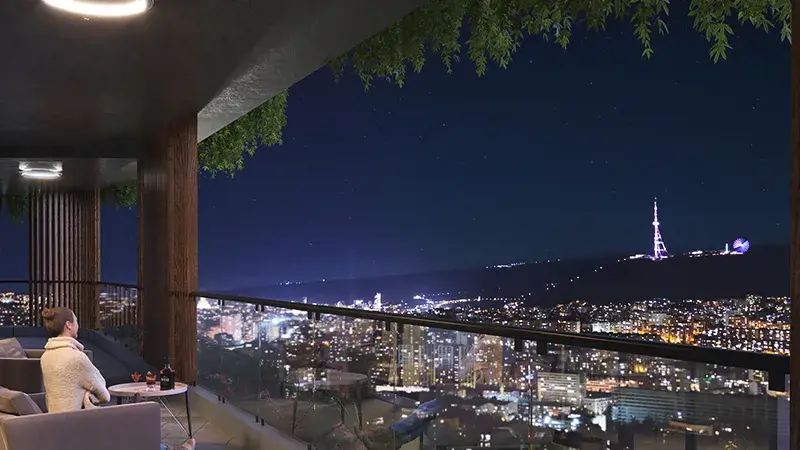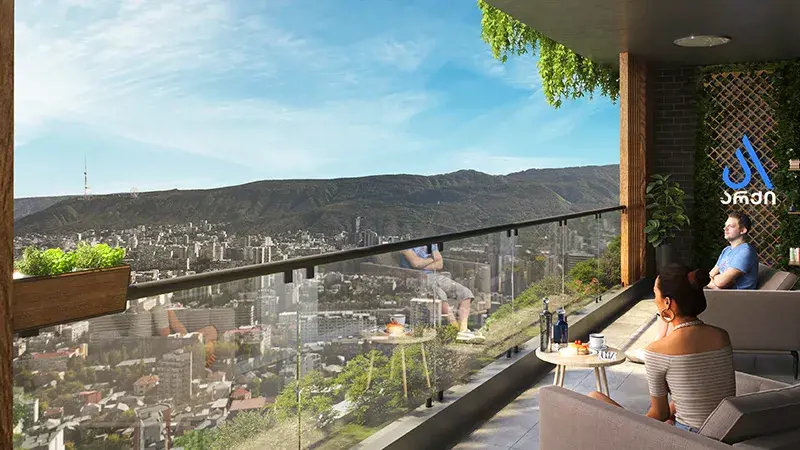About Real Estate In Georgia (Country): Buying to Rent Out
#Other
Over the last half a decade, interest in real estate in Georgia (Country) has been steadily rising. Understandably so: Georgia has a strategically beneficial location (it’s located right at the border of Europe and Asia) and its economic policies and regulations around real estate are one of the most liberal in the world.
With logistics and tourism sectors poised to grow, the opportunities in the country are highly likely to grow with them. And, if you’re an investor looking to diversify without having to pay exorbitant taxes and cut through multiple bureaucratic tapes - the time to strike the iron is now, before the government decides to change any of it.
Understanding Short-Term and Long-Term Rentals: How Do They Work?

Renting out the property you own has been a tried and true method of earning income for millennia. It’s also one of the easiest ways to offset the high costs of actually buying real estate these days - and, if you’re strategically smart with it, earning not-insignificant ROI. The market tends to differentiate between short-term and long-term rentals. And knowing which way you intend to use your property is something you should decide before you buy any. There are fundamental differences between how they function and so there are fundamental differences between properties that often makes it impossible to successfully use a property for both. More often than not, it’s an either-or type of situation.
Short-term rentals mean only leasing property for a brief period, with an end date already in sight — it can range from a single night to a few months, but you rent out knowing there’s an end date within (close) sight. It also typically allows owners to take a higher per-night rent than they’d be able to if they leased to a steady tenant. With entire platforms like Airbnb and Booking.com have made it easier for property owners to connect with potential short-term renters, it’s now considered more lucrative than ever before.
However, there are certain downsides to it as well: there are more active expenses and the income can be highly volatile. The area where property is located strongly affects both possible rates and occupancy rates, and it requires more active management. You don’t just passively receive rent, you need to actively communicate with guests, adjust rates depending on season and demand, be on top of all the utility payments, and be responsible for regular cleaning and maintenance expenses. Owning a short-term rental is a business — you need to be good at running it to get good ROI.
Long-term rentals, in contrast, aim to generate stable income for extended periods — typically one year or longer. With fixed monthly income and less management requirements, it’s often a more attractive prospect to investors who are looking for more stable and comparatively passive income streams. Unless renting out in a city center or a luxury complex, the overall ROI is expected to be lower than that of a short-term rental, but less resources are required to maintain it which is usually considered a fair trade off.
If you're looking to invest in Georgia’s real estate, we’d love to invite you to check real estate projects on Archi's website — but do make sure you know how you intend to manage your investment further down the line.
Foreign investors buying real estate in Georgia benefit from both rental models being accessible without prohibitive regulations, though tax implications differ. Short-term rental income is typically subject to a 5% tourism tax, while standard income tax rates apply to long-term rental income. Investors should be aware that once their total taxable turnover exceeds 100,000 GEL in any continuous 12-month period, an 18% VAT requirement is triggered.
Tbilisi's Rental Landscape: Navigating Short-Term vs. Long-Term Investment

Short-term rentals in Tbilisi are now more in-demand than ever. Investor guides to Georgia real estate love mentioning how the city has transformed not only into a hot European tourist destination, but a digital nomad hub — and it’s true: those low taxes really have done their job. Average daily rates range from $30 to $50 (or more, depending on the location and the project itself). The occupancy rate is trickier — in central districts they sometimes exceed 70% during high season, but median occupancy across the city hovers around 60%, and the rates drop sharper the more you move away from the city center.
On the other hand, the long-term rental market in Tbilisi is solid and stable. Annual rental yields start around 6% and can go all the way up to 12% in well-located properties — and those figures substantially outperform many European cities.
Though, when evaluating potential real estate ROI in Georgia (country), you should always consider that the demand can always turn volatile - be it due to migration, economic downturns, or other reasons. It’s a risk necessary to account for.
On the brighter side, property taxes are low by international standards, with a tiered structure based on the owner's family income. Capital gains tax is 0% if a property is sold after two years of ownership, creating advantageous conditions for long-term holders.
So what is the best real estate investment in Georgia? Hard to say, it depends on what type of risk you’re willing to absorb.
👉 More about Tbilisi real estate investment.
Which Districts Are Best for Short-Term Rental Investment in Tbilisi?

Unsurprisingly, location is a crucial factor whether you intend to rent out short-term or long-term.
For example, Tbilisi's historic center is popular with tourists because of major attractions. But these areas are also increasingly expensive not only for investors, but for visitors as well, who are looking at short-term rentals because they didn’t want to pay hotel rates in the first place. The center is effectively pricing itself out of the middle-income visitors’ reach, and it has created excellent opportunities in other districts.
Saburtalo is another district that short-term rental investors have started to focus their attention on. It’s well-developed, has excellent metro and bus connectivity, and while not necessarily close to most famous city sites, the 30-minutes-at-most commute places them within easy reach. It also helps that one of Tbilisi’s largest shopping malls is in the area. Currently, that means Saburtalo offers significantly better value for initial investment than city center, but can deliver impressive rental returns with good management. Archi Universe, located on University Street in Saburtalo, is one such option, especially with its premium features that could appeal to guests. The amenities include pools, fitness centers, lobbies, concierge services, and commercial spaces within the complex itself. The investors should also take note that the construction uses energy-efficient materials (promising up to 40% utility cost savings), meaning lesser expenses down the line.
Interestingly, another and lesser-expected territory that has seen increased interest from short-term visitors is the Lisi Lake territory. The area is at the same time one of the ecologically cleanest (with lots of greenery), reasonable proximity to the city center (approximately 15-20 minute drive), and with a well-developed recreational infrastructure of its own. With more and more travelers being ecologically aware, it’s safe to assume that areas offering clean air, scenic views, and recreational opportunities will be more in-demand, especially if they’re close to city center. That makes Lisi Lake one of the best places to invest in real estate in Georgia currently. On that note, we have a project of our own nearby — Archi Lisi Sunrise is within a 10-15 minute walk from Lisi Lake and offers extensive (15,000 sqm) green spaces, playgrounds, sports fields, and even cinema facilities.
Which Districts Are Best for Long-Term Rental Investment in Tbilisi?
While central locations dominate the short-term rental market, if investing in real estate in Georgia for long-term tenancies, you may find greater value in Tbilisi's developing peripheral districts. Entry prices here are lower but with expanding infrastructure the living conditions are almost at the city center levels.
Dighomi is one such opportunity, with competitive property prices and growing appeal to middle-class Georgian families and expatriates. It has seen significant development, with new projects like Archi Kikvidze Garden offering extensive family-oriented amenities including 15,000 sqm yards, playgrounds, and even kindergartens. The district is rather far from the center but the transport is very well-connected with two — Didube and Gotsiridze — metro stations, particularly attractive for long-term tenants in need for both affordability and connectivity.
Isani, located on the eastern bank of the Mtkvari River, is another compelling spot for long-term rental investment. The transport used to be its weak spot but there’s a metro station and the district, overall, is undergoing a rather rapid transformation with infrastructure improvements connecting it more efficiently to the city center.
Vashlijvari, with its elevated position and greener environment, typically attracts more affluent professionals and young families willing to pay premium rents for better air quality and views. While it lacks direct metro access, its proximity to amenities like hypermarkets and major roads makes it attractive to residents seeking a balance of tranquility and convenience.
Interestingly, both Saburtalo and the Lisi Lake territories have proven to be quite versatile when it comes to renting. In fact, the last couple of years aside, they have always been territories largely focused on long-term rentals. Saburtalo is still popular among working professionals and students (though the latter are slowly being priced out). Lisi's natural setting, on the other hand, appeals to successful young families and those generally prioritizing eco-friendly lifestyles. You can check out properties in Tbilisi and pick based on your specific demands, budget, and expectations - but we’re willing to bet you’ll find something that fits all these criteria.
It's worth noting that peripheral districts like Dighomi, Isani, and Gldani often show higher gross rental yields (with studios in Didi Dighomi reaching 10.18%) compared to more prestigious central districts like Vake where yields hover around 5-6%.
👉 Check out our real estate development company.
Investing in Georgia's Real Estate Beyond Tbilisi

While Tbilisi commands the lion's share of investor attention, you should definitely check out commercial real estate for sale in Georgia beyond the capital’s boundaries.
Batumi, for example, is almost as hot an investment destination now as Tbilisi. Maybe even the hottest if we’re speaking about the short-term market. Georgia's premier Black Sea resort city is highly seasonal but extraordinarily lucrative during summer months when occupancy rates can approach 100% and daily rates double or triple compared to off-season periods. You can check out Archi Ramada Batumi, if you’re looking for an investment option. The aparthotel is located just 150 meters from the beach and certainly benefits from its Wyndham branding and extensive resort amenities — pools, restaurants, spa facilities — that guests are likely to flock to during on high season.
While primarily known for short-term market success, Batumi properties can also be rather lucrative as long-term rentals with a strategic approach. Targeting remote workers during off-season periods has proven to be effective. During winter months, discounted rates can attract digital nomads drawn by Georgia's visa policies and Batumi's mild coastal climate.
Or, as another option, you could target more off-the-beaten track locations that could interest people looking to get away from city bustle. Archi Le Meridien Sioni Lake Resort & Spa, located approximately 50 km from Tbilisi, is positioning Sioni as one such new, four-season destination.
Like Batumi, Sioni properties could attract a niche STR segment of remote workers or lifestyle seekers drawn to resort living — not necessarily interested in staying a year, but certainly interested in several weeks at least. The natural setting combined with comprehensive amenities creates an environment that could work for extended stays, though the primary investment proposition remains focused on tourism returns.
If you’re looking for a strong real estate ROI in Georgia (Country), definitely try to assess not only traditional investment hotspots, but venture a bit outside: you might find a lot more lucrative deals beyond the large cities, ones poised for success as long as proper marketing strategy and management are applied.
The real estate landscape is evolving rapidly, and Georgia is no exception. For strategic investors willing to research thoroughly, Georgia's combination of liberal ownership policies, strong rental yields, and emerging tourism sectors creates a compelling investment proposition with considerable upside potential.







